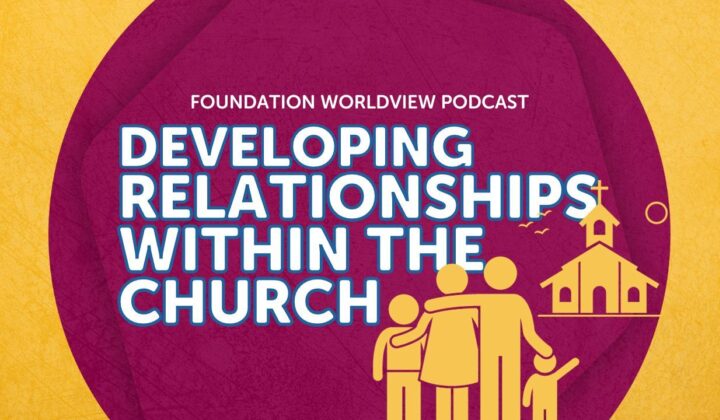Learn more about the journey that led to us equipping kids to carefully evaluate every idea they encounter.
Meet members of our team who have contributed to curriculum development.
Hear from real users of the Foundation Curriculum.
Learn what we believe about God, Jesus, Scripture, and more.
How to Approach Your Church About Family Ministry
Hello, friends. Today's podcast question says: "I'd like some ideas on how to approach our church to have a family ministry. All the current ministries are about separating families, and it hurts my heart. Our family doesn't participate in those activities. It's challenging to promote family ministry in this culture."
This is a really interesting question, and it's one that I think many Foundation Worldview podcast listeners can resonate with. In so many churches—and in fact, I would argue the majority of evangelical churches, especially across the US—we have just adopted this secular model of breaking people up into ages and stages. So there's a kindergarten classroom, and then there's a first grade classroom, and then there's a young married Sunday school class and there's an empty nester Sunday school class and there's a singles Sunday school class.
This model, while there can be some room for having people get together for social activities, there is not a lot of wisdom when you get just a homogenous group of people together who are all in the same stage of life. So this is a real problem in the evangelical church in the US.
Today we're going to look at this question: if somebody has a desire to approach church leadership about this, what is a wise way to do this?
Five Principles for Approaching Church Leadership
As we think about approaching church leadership about starting a family ministry or segregating people less frequently, I think that anytime we are approaching leadership with a suggestion or a complaint, we need to make sure that we are doing so humbly. We don't want to go in with an attitude of pride or arrogance.
There are five things that we can walk through anytime we want to approach the leadership at our church with a recommended suggestion or complaint and how to do so humbly.
1. Recognize God-Given Authority and Pray
First, we need to recognize that God has placed our pastors in a position of authority over us, and we should pray for them and respect them. Now, this doesn't mean that we submit to them if they're asking us to do something that's unbiblical, or that we automatically do that if they're asking us to do something that is extra-biblical. But it does mean that we need to have respect for them—a proper biblical respect for them and their position of authority.
We should also be praying for them regularly because we as laypeople can't understand the different pressures that our pastors are under or even the different types of spiritual battles that they are facing on a weekly basis. They are in the office of shepherding the flock of God.
2. Build Relationship Before Bringing Concerns
The second thing I think we need to do is ensure that we have a relationship with them. We can't just be going to those in leadership over us with our complaints. Now, I understand that in larger churches it can be difficult to have a relationship with the pastors. If you're going to a church that has more than 500 people in it, it's going to be almost impossible for the senior pastor or even other different pastors to know everybody in the church.
Personally, I am a really big believer in smaller churches because I think smaller churches do a much better job of shepherding the flock in general. However, that's not always the case, and I know that there are some benefits to having a larger church. But if you are going to the leadership at your church to ask for a change in something or to complain about something, ensure that you have a relationship with them. You're not just only going to them with your complaints.
So you can think through: Have you had the pastor and his family over for dinner? Have you made other times to get to know him? Because a lot of times when we have relationships with people, we'll understand their leadership style a lot better.
3. Approach with a Desire to Learn
The third thing that I think we need to do anytime we are approaching the leadership at our church with a suggestion or complaint is that we need to approach the conversation with a desire to learn. We can go and we can express our concern, but we can also ask the pastor to help us understand why things are the way they are.
So in this situation with the person asking about approaching the pastor or the church leadership about having a family ministry and not being fond of all of the breaking up of people into ages and stages, just ask: "Is there something that I'm missing? I see this as something that really isn't biblical—constantly breaking up the family rather than having them worship together and doing different activities together. Can you help me understand why things are the way that they are?"
Because we may be making assumptions about things that are not accurate, or there may be things going on behind the scenes that we don't understand simply because we are not in that position of leadership. So I would recommend going into the conversation with a genuine desire to learn.
4. Be Part of the Change You Want to See
Number four: I recommend being part of the change that you are hoping to see. Don't just go to leadership with a complaint and say, "Okay, please do something about it." But go in with a desire to participate in this change that you are hoping to see.
So in this situation with this person who's desiring to start a family ministry, ask if you could start something that would include families, or ask if you can be a support if somebody else starts this. Show that you're not just going to complain, but you actually want to be part of this healthy change in your church.
Focus on Life Together, Not Just Programming
Now, for this particular questioner who's asking about starting a family program, this is just my two cents, so take it with a grain of salt. But I would encourage you, as you're thinking through making this change in your church, to focus on making this change in doing life together with other families at your church rather than on programming.
The US Church is very heavily focused on programming. A lot of times the church is run more as a business and less as the body of Christ. When we look at Scripture, the New Testament does not negate programming. When we look in the Book of Acts, there was a program right from the early church to feed the widows that needed to be fed every week. So the New Testament isn't against programming.
However, when you look at what is presented in the Book of Acts, most of what was going on in the church was focused on life together. So again, I'm not saying that there's never a time for programming. There can be times for programming. However, the US Church is just so heavily focused on that, that we tend not to actually live as the body of Christ.
So I would recommend even before approaching your pastors, just start making some of these changes in your own family life. Start opening up your home to other families or couples or single individuals in your church on a regular basis.
Practical Examples
One thing that my parents do that I think is really great is once a month, they just have an open house at their house. Now, my parents do not have a very large house, but they just open their house up to anyone from church who wants to come by for lunch. My mom, both of my parents are very capable and have very high energy levels. So my mom is frequently cooking for—they'll frequently have around a hundred people at these events. My mom plans for it ahead of time, but they just have this regular rhythm. I think it's the second or third Sunday of every month; they just know that there's an open house at their house.
Now, you don't need to do something so extravagant, but just find one or two families or couples or individuals that you can start having over once a month to your home. Or start hosting a small group. Start diving into the regular rhythms at your church and opening up your home for that, because members of your church body are going to most likely learn much more from you by observing what your home life looks like than from some weekly family programming you start.
Again, I'm not saying there's never a place for programming, but most of what people are going to learn is just by observing you in your home.
If your church already hosts small groups or they have Sunday school classes, you could ask: Could you start a small group or a Sunday school class that meets family style where it's kids and parents together? So rather than maybe starting a whole new kind of programming, just lean into the programming that is already available at your church and ask if you could tweak it so that families are not being divided into ages and stages.
5. Pray for Wisdom
My fifth recommendation for any time we are seeking to have change made at a church is to pray for wisdom. Just pray, "Lord, please give me wisdom in the situation. How would you have me go about this?"
Maybe in this situation God may be calling you to help make change structurally at your church. Maybe he is calling you to go in and talk with the leadership at your church and see if you can actually start a new kind of ministry. Or maybe he's calling you to continue living faithfully where you are and make change in your community by opening up your home and inviting others into your life. Maybe he's calling you to do both of those things. Maybe he's calling you to something else. But just pray for wisdom because God has promised to give us the wisdom that we need when we ask him.
Conclusion
So just as a wrap-up, the five principles I talked through are:
First, we need to recognize that God has placed our pastors in a position of authority over us, and we should pray for them and respect them.
Two, we should ensure that we have a relationship with them and that we are not only going to them with our complaints.
Three, we should approach the conversation with a desire to learn.
Four, we should be part of the change that we hope to see.
And five, we should pray for wisdom.
Whether you're seeking to start a family ministry at your church or simply wanting to strengthen family bonds within your church community, these principles will help guide your conversations with leadership in a way that honors God and builds His kingdom.
If you found this episode helpful and want to stay equipped with biblical wisdom for the challenges facing families today, join our email list to receive regular insights and resources. Don't miss out on future content that will help you navigate these important conversations and equip the children God has placed in your care with a strong biblical worldview. You can also explore Foundation Worldview's curriculum designed specifically to help families evaluate every idea through the lens of Scripture.
Well, that's a wrap for this episode, but if you have a question that you would like for me to answer on a future Foundation Worldview podcast, you could submit that question by going to FoundationWorldview.com/podcast.
As we leave our time together, my prayer for you is that no matter the situation in which you and the children God has placed in your care find yourselves, you would trust that God is working all things together for your good by using all things to conform you more into the image of His Son. I'll see you next time.
Related Posts and insights

Developing Relationships within the Church
In this episode of the Foundation Worldview podcast, host Elizabeth Urbanowicz addresses a vital question: "How do I help my kids develop relationships within the church?" Tune in to discover how we can equip the next generation to build strong, God-honoring relationships amidst the challenges of modern technology and a culture that often runs counter to the values of repentance and forgiveness.

Sports on Sundays? When Sports Clash with Church
Today's question says, "How do we deal with sports on Sunday mornings? I have all sons, and baseball is a fun thing, but many tournaments are on Sunday mornings. How do we practically walk through being committed to a team, but keeping commitments to God first. Are a few Sundays out of the year okay?"

Teaching Kids to Tithe: Joyfully, Generously, and Sacrificially
Today's question says, "How do I teach my children about tithing?" Discover what the bible says about tithing and practical tips to help your kids honor God, give joyfully, and wisely manage their finances in this episode of the Foundation Worldview Podcast.



